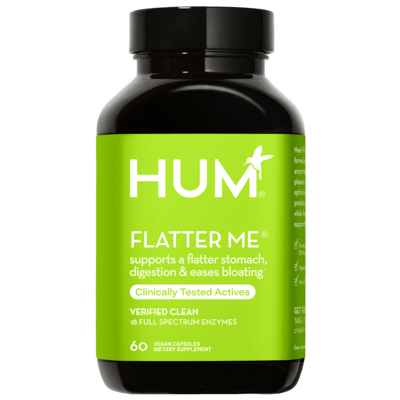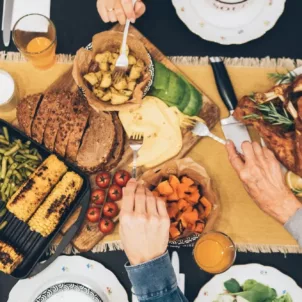PSA: Even healthy foods can cause bloating.
By now you probably know to avoid processed and salty foods when it comes to avoiding bloat. But even for the cleanest of eaters, there are a few sneaky health foods that can cause gas and bloating. Here are seven offenders that you may want to avoid before a beach day or special occasion. But first…
Although sparkling water and kombucha are both excellent healthy replacements for sugary sodas, the bubbles are still going to cause bloat. “Anything that’s carbonated is going to add extra gas in your body that’s not supposed to be there,” Sarah reminds us.
Kombucha can especially cause confusion because it’s lauded for its probiotic benefits. “With kombucha though, you’re also getting extra sugar that can feed bad bacteria,” Sarah warns.
Instead, try sticking to still water with lemon or herbal teas as tasty beverage alternatives.


What These Culprits Have In Common
“There are two main reasons for foods to cause bloating,” says Sarah Greenfield, RD. “First, foods that feed bad bacteria in the gut can produce gas. Secondly, your digestive tract is designed to move food through it. When your body isn’t able to move food through efficiently, it starts to ferment, causing bloating.” Taking a broad-spectrum digestive enzyme can help keep things in your body moving. However, if you have a pool party or big night out coming up, consider avoiding these foods that cause bloating a few days prior.9 Healthy Foods That Cause Bloating
 Sparkling Water & Kombucha
Sparkling Water & Kombucha
Although sparkling water and kombucha are both excellent healthy replacements for sugary sodas, the bubbles are still going to cause bloat. “Anything that’s carbonated is going to add extra gas in your body that’s not supposed to be there,” Sarah reminds us.
Kombucha can especially cause confusion because it’s lauded for its probiotic benefits. “With kombucha though, you’re also getting extra sugar that can feed bad bacteria,” Sarah warns.
Instead, try sticking to still water with lemon or herbal teas as tasty beverage alternatives.
Beans
You know what they say: beans, beans, the magical fruit, the more you eat, the more you… don’t want to put on a swimsuit? On one hand, beans are a great source of nutrients and fiber—but they also contain a tricky little starch called raffinose, which is difficult for our bodies to digest and therefore susceptible to fermenting in our digestive system. As an alternative, fish is an excellent lean protein that shouldn’t induce bloating. Or if you’re a vegetarian, you can incorporate unsweetened nut butters.Raw Vegetables
Think twice before you hit that kale salad. Raw vegetables are high in fiber, which can cause some serious bloating problems. Unlike carbohydrates, fats, and protein, fiber isn’t absorbed by the body. Instead, its job is to move through the digestive system to both hydrate and sweep out your intestines and encourage regular bowel movements. That said, if your body is moving fiber through the body too slowly—or you suddenly increase your fiber intake—that’s when the fiber can ferment. Cruciferous vegetables are problematic in particular because they contain easily fermentable fibers like pectin. Examples to watch out for include kale, cauliflower, broccoli, cabbage, and Brussels sprouts. “Cooking your vegetables can help a lot to make them more easily digestible,” Sarah shares. “I think of cooking as pre-digestion because you’re using heat to break down the ingredients before they enter your system.”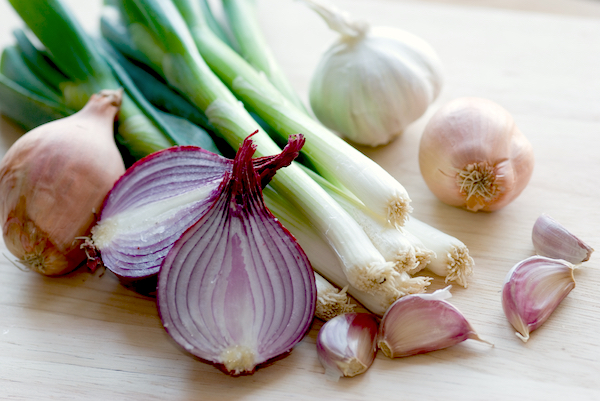
Garlic & Onion
It’s a delicious combo for flavoring meals, but sadly, both of these tasty ingredients can cause bloating and trigger people with IBS. In fact, Buddhist monks notoriously omit garlic and onions due to their pungency. Sarah’s take? “Both garlic and onion are high in fructooligosaccharides, which are another easily fermentable fiber.” To flavor your food without these ingredients, use belly-friendly spices like ginger, turmeric, and fennel. These spices not only add lots of flavor but are also great for digestion.Chewing Gum
We don’t really count this as a health food, per se. But we hear chewing gum recommended in place of snacking so often that we’ll address it here for the health minded. There are two ways chewing gum can cause gas. First, many contain artificial sugars that are hard for the body to absorb. Then, in the process of chewing gum, you tend to swallow air. “Don’t forget, what goes in must come out!” Sarah warns. So if you’re not burping, you can bet all that air is getting trapped in your digestive system, causing gas and bloating. Try sipping water throughout the day instead of chewing gum, as a dry mouth can lead to bad breath. But if you insist on a minty refreshment, opt for natural mints instead.Yogurt
Yogurt has beneficial probiotic properties for gut health. That said, many have a ton of added sugar which will feed bad bacteria in the gut and counteract any benefits. Also, the U.S. National Library of Medicine estimates that a whopping 65 percent of people have sensitivities to dairy, which can further result in bloat. We’re big fans of coconut yogurt as an alternative—but as always, look for one without any added sugars!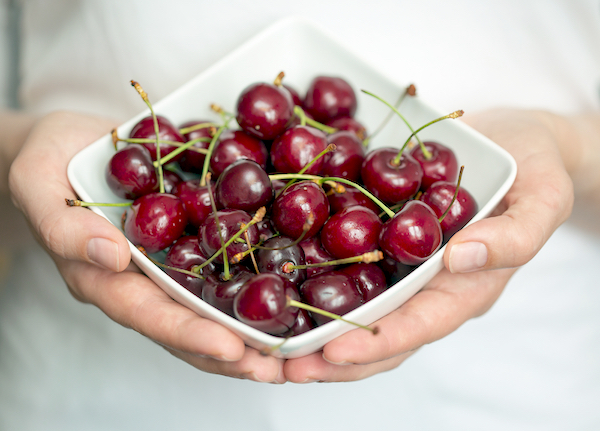
Fruit
Specifically, fruits high in fructose including apples, cherries, mangoes, watermelon, and pears can cause bloating. Fructose is harder for our bodies to absorb compared to other sugars, which—you guessed it—can lead to bloating among other gastrointestinal disorders. By contrast, pineapple and papaya are two fruits that are much lower in fructose and have natural digestive enzymes to help optimize digestion.Processed Vegan Foods
Think meat substitutes and vegan cheese here. There are a few things you should watch for in this category. First, they can contain a lot of gluten, to which many people are sensitive. Then, they’re often high in vegetable starches or fibers, which can overwhelm the digestive system especially when highly processed. Instead, opt for tofu as a clean source of vegan-friendly lean protein.Water
Before you freak out, hear us out. We’re not suggesting you drink less water, rather to maybe adjust the timing of your water intake around meals. “Your body has certain digestive enzymes and acids to help break down food,” Sarah explains. If you smell something cooking, or even see something yummy, your body starts producing enzymes in your stomach that help you get ready to digest your meal. You want to make sure you don’t dilute these internal processes with water right away. Sarah advices giving yourself 20 to 30 minutes after your last glass of water before having a meal and waiting another 20 to 30 minutes after your meal before sipping again. This timing sets you up for optimal digestion potential and minimal bloating.More like this
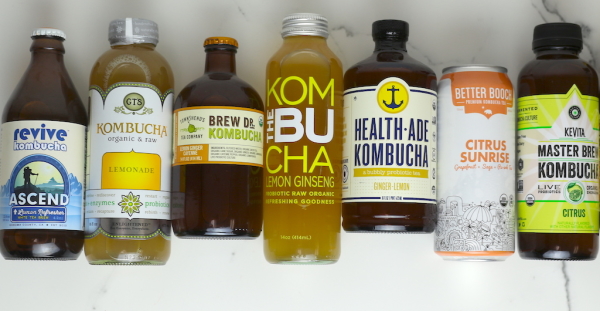 Sparkling Water & Kombucha
Sparkling Water & Kombucha